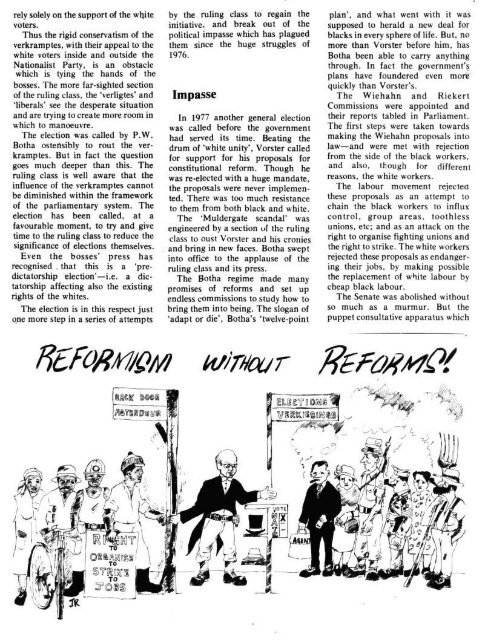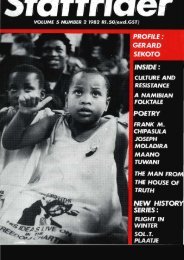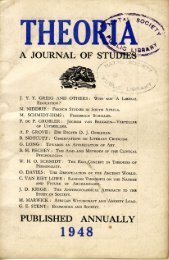Inqaba ya basebenzi Number 2 April 1981 - DISA
Inqaba ya basebenzi Number 2 April 1981 - DISA
Inqaba ya basebenzi Number 2 April 1981 - DISA
You also want an ePaper? Increase the reach of your titles
YUMPU automatically turns print PDFs into web optimized ePapers that Google loves.
ely solely on the support of the wrjite<br />
voters.<br />
Thus the rigid conservatism of the<br />
verkramptes, with their appeal to the<br />
white voters inside and outside the<br />
Nationalist Party, is an obstacle<br />
which is tying the hands of the<br />
bosses. The more far-sighted section<br />
of the ruling class, the 'verligtes' and<br />
'liberals' see the desperate situation<br />
and are trying to create more room in<br />
which to manoeuvre.<br />
The election was called by P.W.<br />
Botha ostensibly to rout the verkramptes.<br />
But in fact the question<br />
goes much deeper than this. The<br />
ruling class is well aware that the<br />
influence of the verkramptes cannot<br />
be diminished within the framework<br />
of the parliamentary system. The<br />
election has been called, at a<br />
favourable moment, to try and give<br />
time to the ruling class to reduce the<br />
significance of elections themselves.<br />
Even the bosses' press has<br />
recognised . that this is a 'predictatorship<br />
election'—i.e. a dictatorship<br />
affecting also the existing<br />
rights of the whites.<br />
The election is in this respect just<br />
one more step in a series of attempts<br />
by the ruling class to regain the<br />
initiative, and break out of the<br />
political impasse which has plagued<br />
them since the huge struggles of<br />
1976.<br />
Impasse<br />
In 1977 another general election<br />
was called before the government<br />
had served its time. Beating the<br />
drum of 'white unity', Vorster called<br />
for support for his proposals for<br />
constitutional reform. Though he<br />
was re-elected with a huge mandate,<br />
the proposals were never implemented.<br />
There was too much resistance<br />
to them from both black and white.<br />
The 'Muldergate scandal' was<br />
engineered by a section of the ruling<br />
class to oust Vorster anil his cronies<br />
and bring in new faces. Botha swept<br />
into office to the applause of the<br />
ruling class and its press.<br />
The Botha regime made many<br />
promises of reforms and set up<br />
endless commissions to study how to<br />
bring them into being. The slogan of<br />
"adapt or die', Botha's 'twelve-point<br />
plan\ and what went with il was<br />
supposed to herald a new deal for<br />
blacks in every sphere of life. But, no<br />
more than Vorster before him, has<br />
Botha been able to carry anything<br />
through. In fact the government's<br />
plans have foundered even more<br />
quickly than VorsterY<br />
The Wiehahn and Riekert<br />
Commissions were appointed and<br />
their reports tabled in Parliament.<br />
The first steps were taken towards<br />
making the Wiehahn proposals into<br />
law—and were met with rejection<br />
from the side of the black workers,<br />
and also, though for different<br />
reasons, the white workers.<br />
The labour movement rejected<br />
these proposals as an attempt to<br />
chain the black workers to influx<br />
control, group areas, toothless<br />
unions, etc; and as an attack on the<br />
right to organise fighting unions and<br />
the right to strike. The white workers<br />
rejected these proposals as endangering<br />
their jobs, by making possible<br />
the replacement of white labour by<br />
cheap black labour.<br />
The Senate was abolished without<br />
so much as a murmur. But the<br />
puppet consultative apparatus which
















